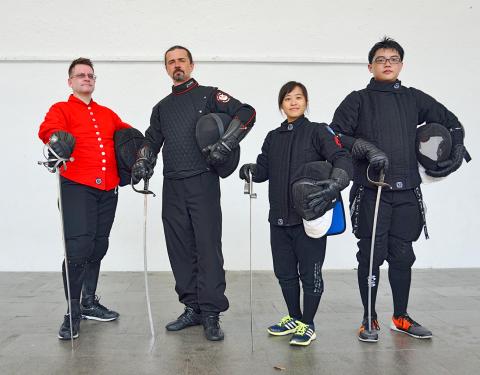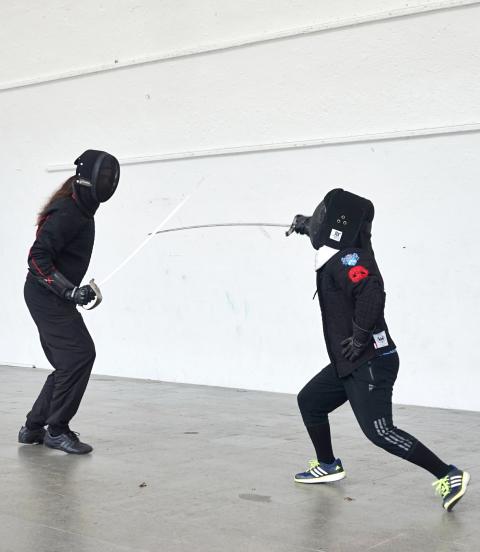If you ever wanted to witness a duel with real French small swords, say, or Italian sabers, the Lionheart Historical European Swordsmanship club will be holding a public training session outside the concert hall of Chiang Kai-shek Memorial Hall tomorrow where all are welcome to watch. The club practices at least twice monthly.
Huang Chun-yi (黃郡儀), the club’s founder, grew up watching movies such as Lord of the Rings and Kingdom of Heaven and read books like Alexandre Dumas’ The Three Musketeers. When she was older, she did some research about fencing and found a trove of historical fencing manuals online.
“I started my practice with a stick,” the 25-year-old tells the Taipei Times.

Photo: Dana Ter, Taipei Times
Huang joined her university’s fencing club before founding the Lionheart Historical European Swordsmanship club in 2014. While Historical European Martial Arts (HEMA) has been practiced in Europe for decades, it’s just recently gained traction in Taiwan.
The difference between Olympic-style sports fencing and HEMA, Huang says, is that while the goal of the former is to score points, the latter seeks to recreate various styles of European sword fighting over the last few centuries with real steel weapons modeled closely after historical weapons. Competition and spectatorship is de-emphasized in HEMA, which is regarded by its practitioners as more of a hobby and for the purpose of preserving tradition through recreating duels and combat moves.
The club imports most of their swords from the Ars Dimicatoria (which is Latin for “Art of Fencing”), a HEMA school based in Prague. Michael Knazko, an instructor from the school, was in Taipei last month to train members of the club. Needless to say, the club tends to attract history buffs, and many members also have experience in Chinese martial arts, kendo or sports fencing.

Photo: Dana Ter, Taipei Times
We come to HEMA “wanting something closer to what the warriors of old have done,” says club member Kevin Yang (楊凱文).
He has a pdf file of the 14th-century Italian knight and fencing master Fiore dei Liberi’s fencing manual, Fior di Battaglia (“The Flower of Battle”), on his smartphone, which he tries to study regularly.
“We seek authenticity in HEMA,” Yang adds.
In addition to using weapons modeled after historical ones, HEMA practitioners worldwide also try to mimic the techniques and moves of ancient European swords masters as closely as possible.
Club member Jonathan Burke points out that this is what distinguishes HEMA from live action role-playing (LARP) or cosplay: “In HEMA, you’re not a fictional character, you’re recreating and perpetuating a historical tradition.”
He adds that safety is taken seriously in the club and that it’s ensured by various factors including several layers of protective clothing and a deliberate restraint of force.
Event notes
What: Lionheart Historical European Swordsmanship (獅心歷史歐洲劍術) training session
When: Tomorrow from 9:30am to noon
Where: Chiang Kai-shek Memorial Hall (中正紀念堂), 21-1 Zhongshan S Rd, Taipei City (台北市中山南路21-1號)
Admission: Free
On the net:www.facebook.com/leohistoricaleuropeanswordsmanship

The canonical shot of an East Asian city is a night skyline studded with towering apartment and office buildings, bright with neon and plastic signage, a landscape of energy and modernity. Another classic image is the same city seen from above, in which identical apartment towers march across the city, spilling out over nearby geography, like stylized soldiers colonizing new territory in a board game. Densely populated dynamic conurbations of money, technological innovation and convenience, it is hard to see the cities of East Asia as what they truly are: necropolises. Why is this? The East Asian development model, with

June 16 to June 22 The following flyer appeared on the streets of Hsinchu on June 12, 1895: “Taipei has already fallen to the Japanese barbarians, who have brought great misery to our land and people. We heard that the Japanese occupiers will tax our gardens, our houses, our bodies, and even our chickens, dogs, cows and pigs. They wear their hair wild, carve their teeth, tattoo their foreheads, wear strange clothes and speak a strange language. How can we be ruled by such people?” Posted by civilian militia leader Wu Tang-hsing (吳湯興), it was a call to arms to retake

This is a deeply unsettling period in Taiwan. Uncertainties are everywhere while everyone waits for a small army of other shoes to drop on nearly every front. During challenging times, interesting political changes can happen, yet all three major political parties are beset with scandals, strife and self-inflicted wounds. As the ruling party, the Democratic Progressive Party (DPP) is held accountable for not only the challenges to the party, but also the nation. Taiwan is geopolitically and economically under threat. Domestically, the administration is under siege by the opposition-controlled legislature and growing discontent with what opponents characterize as arrogant, autocratic

When Lisa, 20, laces into her ultra-high heels for her shift at a strip club in Ukraine’s Kharkiv, she knows that aside from dancing, she will have to comfort traumatized soldiers. Since Russia’s 2022 invasion, exhausted troops are the main clientele of the Flash Dancers club in the center of the northeastern city, just 20 kilometers from Russian forces. For some customers, it provides an “escape” from the war, said Valerya Zavatska — a 25-year-old law graduate who runs the club with her mother, an ex-dancer. But many are not there just for the show. They “want to talk about what hurts,” she